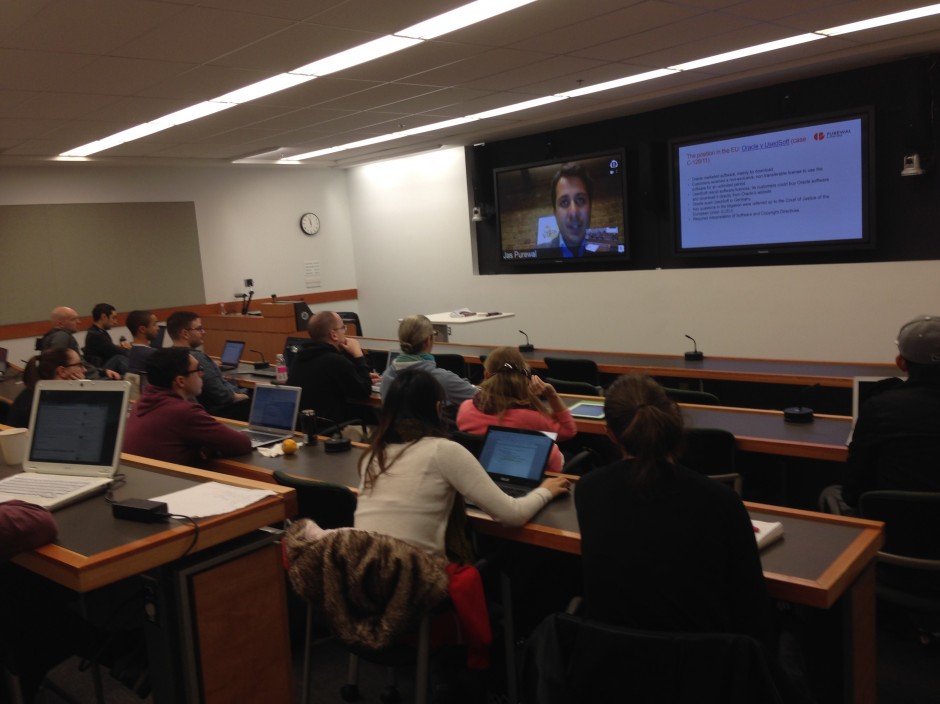
“joss” wrote a great and most appreciated post titled “Future Reflections” which can be found here: http://videogame.law.ubc.ca/2014/11/26/future-reflections/ In the post she makes several well taken observations about where the course and it’s pedagogic approach could lead. That post made me think about what the future opportunities for Video Game Law might be. Since the course will be offered again in September 2015, what follows are some early thoughts on what could come next. Any and all feedback would be greatly appreciated.
So what follows are a bunch of ideas, some far-fetched and some almost inevitable. To make matters more confusing they are in no particular order other than the order they came to mind…
1. UBC Video Game Law Wiki: In the unfinished business category, it would be great to finish creating a useable UBC Wiki on Video Game Law accessible through this website where students could voluntarily post their papers and any contributions they wish. With the help of the UBC Centre for Teaching, Learning & Technology that almost got done this semester and may yet make it up in January 2015.
2. Badges 2.0: Badges were a very low key experiment this past semester. The data shows that it was a very successful one. In a course where the stated pedagogic metaphor is to emulate an open world role playing game where students are provided with terrains to explore and tools to explore them with, badges have some potentially fascinating applications. They can be used as virtual maps to individual goals. For example a badge that maps a students progress through materials relating to copyright issues, or freedom of expression, or EULA problems, or you name it. Badges can certainly be for more then posts and comments and it would certainly be cool to see what achievement maps could be created that students could voluntarily explore if they were interested and inclined.
3. Video Game Law open and scalable curriculum: Will mention this here because oddly enough it is an outgrowth of our UBC badges group. Video game courses and programs are one of the fastest growing areas in higher education. An embryonic idea that has been discussed with the UBC Centre for Teaching, Learning & Technology is the possibility of building a digital tool for teachers who want to include some legal aspects in their video game courses or programs. The tool would allow teachers to create their own video game law curriculum from the rather large amount of material already on this website and allow for scalability from one class all the way to an entire course. Remember this tool is not aimed at law schools but rather at post-secondary institutions that offer degrees relating to videogame/digital media studies to artists, creators, programmers, computer scientists etc.
4. Oculus Rift 2.0: Perhaps the biggest surprise of the semester was how well the Oculus Rift experiment went in terms of real-life pedagogic potential. What would be wonderful would be to take the next step with the tech and try and incorporate feedback loops between the “live” classroom and the “Rift” classroom that would make the experience seamless in both venues.
5. Doubling Up: In a way this idea flows from the Oculus Rift experiment. During the first year of Video game Law (we just finished 8th edition of the course) and owing to some unusual circumstances, the course was offered in two Law Schools (UBC & UVic) as a single course. The two classrooms were video-conferenced together and I would alternate my physical presence on a weekly basis between the two schools. It worked out really well. Now that was roughly 1o years ago, used relatively unsophisticated technology and had no website. So perhaps I might be forgiven for wondering whether something along the lines of joining two(or more) law school classes might be worth trying again.
6. Website Accessibility: One of the most gratifying aspects of the course has been the way alumni have remained interested in the course and its progress. Another is the commitment and generosity of so many guest speakers. In a very real sense the course has an evolving community of interest. To make the most of that means making it as easy as possible for everyone to access and make meaningful contributions to this website. That is a continuing technological evolution. Hopefully next year we will be in a position where those who are interested can simply (but with approval) gain author status on the site. Building community and allowing past years students to stay involved if they wish would be a dream come true.
jon
 Communications Law
Communications Law